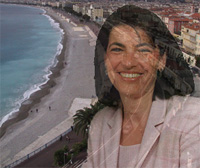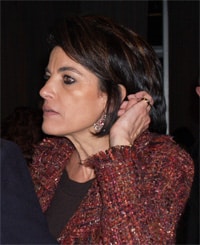Councilwoman Dominique Estrosi opens up to Nice Première. Between professionalism and emotion, she talks about her daily life.
 Nice Première : What are your strengths and weaknesses at work?
Nice Première : What are your strengths and weaknesses at work?
Dominique Estrosi: I am persistent. I like to see things through to the end. My goal is to finish what I start. This can be both a flaw and a quality.
The same goes for my straightforwardness. I don’t mince words, a flaw that has often and greatly cost the political class. A discredited political class that is pointed out by the citizens. Because both on the Right and the Left, the discourse is very “politically correct.” As a result, the French no longer trust them.
I am also determined, and especially passionate.
NP: What is your relationship with Mayor Jacques Peyrat?
DE: Our relationship is frank and loyal. I have told him before that I disagreed with him. I think it would not be a service to be a “courtier” of “yes” at any cost. So I do not hesitate to express my opinion. However, it is he who is the mayor, and in the end, it is he who decides.
NP: What is your relationship with the municipal opposition?
DE: I respect the opposition. In a democracy, it’s the least one can do. They were elected by a segment of the population. Through them, a part of the people of Nice is represented. Not respecting them would imply not respecting the Niçois who chose them. This doesn’t prevent having a different vision of things.
NP: What led you into politics?
DE: My father was a deputy mayor of the city of Nice. I have always been immersed in this environment. My husband is also involved in politics. So it’s not something new that came upon me. Moreover, I happen to love my city. I have always been interested in what was happening here. After my law studies, I directly joined the mayor’s office from 1981 to 1985. Therefore, entering politics was not a revelation.
NP: How did you become a Municipal Councilor?
DE: Jacques Peyrat asked me if I wanted to join him. At that time, I was following and assisting my husband. I took the step by accepting.
From the shadows, I thus stepped into the light by becoming a female politician. I then made a first name for myself next to my surname. Today, the French recognize me as an elected official and not just as the wife of a politician.
NP: What does your position mean to you?
DE: I am glad to practice this profession because I love my city. I see that my responsibilities can bring something better to my fellow citizens. Especially in the difficult neighborhoods I handle. It works thanks to proximity.
As a Councilor, I often visit these areas to be in contact with the residents, to show them that I am there, in both good times and bad. And they appreciate it. I have never had a problem so far. Admittedly, I cannot intervene in every case. My role then consists of explaining what is achievable and what is not.
I try to consider all requests, all files. Everyone counts in my eyes. Some take more time to process because the demands are numerous. The days are only 24 hours long, it becomes impossible to handle everything immediately. Be that as it may, I am committed to following up.
NP: What do you like about your function?
DE: I like going to meet people. Those who have seen me feel it. In the sensitive neighborhoods, there is a real solidarity that exists. A solidarity that I do not see elsewhere. There are talented people. Others are dedicated to their neighborhood. It’s a considerable strength. For me, it’s very enriching, very exciting.
I have learned a lot. And ultimately, these people don’t ask for much. It’s beautiful to know that. Nowadays, society is very selfish, very individualistic, and always contesting everything. Now, the challenge in these neighborhoods consists of rebuilding trust with the residents. At certain places, they have seen elected officials promise them the moon and not necessarily deliver. It’s normal that they are wary! But if we play a fair game, if we involve them at all levels, everything goes well.
For example, when we launch a project: if from the start we include them, we get them to participate in the project, they will respect it, they will be proud of it, they will value it, so we have everything to gain. Naturally, this requires more availability, more presence, a certain willingness, and you have to love it. If we force ourselves, the people in front feel it and it doesn’t last long.
For me, my passion is still intact after five years. I love ensuring that a file reaches its conclusion. I have already managed to initiate many. I am really motivated by so many social relationships. My delegation allows me to touch on everything. The areas are varied. It’s exciting. You never fall into routine. I have learned a lot on the job.
NP: Can you share an anecdote that marked you in your career?
DE: It’s the everyday. These are small events, people, that touch me. Recently, it happened to me. It was at Jules Romain college, in the Moulins neighborhood. The principal invited me to a book signing for a youth book. The mothers were honored to be there. The young people were singing rap and speaking about their neighborhood in a valorizing way. It was moving. Then, the author read his book to the young people. They were amazed and attentive. After a while, they explained that they didn’t like to read but were interested in the story. Then they asked the author if it was possible to make it into a tape. That was really nice.
 NP: How do you balance your professional life and your life as a mother?
NP: How do you balance your professional life and your life as a mother?
DE: I don’t have the constraint of having young children who, for example, would require me to manage school outings. My daughters are older and thus more autonomous. This does not mean that they do not need me. It’s important that I see them, even though it’s true that I have less availability.
Currently, my oldest daughter is preparing for a competition. If she is having difficulties, she knows she can count on my help… Even if I am not always of great help. I try to be there. I don’t say that I am a “superwoman.” But as I am more in the spotlight, this requires better organization. I think I manage well.
We often go out together to shop or for walks. We also reserve weekends in the mountains. When I can have lunch with them, I do it. So, all in all, it goes rather well.
NP: Have there been changes since your husband became a minister?
DE: Certainly. He is even less available than before. Monday to Friday, he is in Paris. And as I stay in Nice, and I intend to stay… But that’s part of life choices.
NP: What do you think of women in politics?
DE: Women are perhaps less obsessed with what might happen in a few years or with a career at all costs. I am happy to exercise the responsibilities that have been assigned to me. And I do not aim higher.
As for parity, I am opposed to it. Quotas are derogatory for a woman. I acknowledge, however, that without parity, there would still be no women in politics. However, we must not fall into a fad. That is to say, thinking that we need to put women everywhere. They must prove their competence. But I believe that they are sufficiently combative, courageous, and pragmatic to be up to their mandate.
From there, a woman is capable of handling any field just as well as a man. I even find it better to put a woman in a delegation where she is not expected. Because the human and social fiber, the sensitivity is different from men. This is actually a difference that probably makes things go better. This does not mean that men are incapable. Some men have these qualities. But it’s mainly the personality that counts.
NP: Name three female politicians who have made an impression on you.
DE: Margaret Thatcher is astonishing. Because at the time she served as prime minister in England, she made changes in a purely male environment. Sincerely, hats off.
Michelle Bachelet surprised me. Her path is atypical. I do not know how she will manage, but to have reached so high, she catches my attention.
Michèle Alliot-Marie is also a force to be reckoned with. She was the first woman to be president of a party. And now, she is the Minister of Defense. The same for Ségolène Royal. Although our opinions differ, I am impressed by her career. She was the first female regional president. Both of them have elegance and represent well the women of today.
NP: You take care of community life. What do you think of community spaces?
DE: With more than 4000 associations in Nice, these public facilities had become necessary. They were created to simplify the task for association presidents. Thus, they can fully take care of their purpose and not all the legal and administrative formalities.
NP: What are the future projects in the community sector planned by the city?
DE: In the Pasteur neighborhood, we will create a public facility of proximity that will both host a toy library and a space for associations. In Bon Voyage, a construction is underway. It will be a socio-cultural center. The associations in the neighborhood will be able to benefit from rooms to meet.
NP: Your role also touches on the area of housing. Nice records a multitude of vacant dwellings. What are the solutions?
DE: We are actively seeking solutions. We offer landlords subsidies. We grant them 0 and 1% loans; Currently, it’s going well. We are in full action. The results will be felt from this year. But really in 2007-2008.
NP: In Paris, last year, several tenants died in fires due to insanitary conditions and the lack of respect for safety rules. Does Nice risk such dramas? Concretely, what do you do to prevent this?
DE: It is true that we are not immune to such catastrophes. Since these accidents, the city is more attentive to this problem. But in Nice, the city hall is not the owner of all the apartments. In this case, it cannot act, nor necessarily know about it. However, if the apartment belongs to the municipal domain, actions are put in place. When we receive a tenant’s complaint, the urban risk prevention service immediately goes on site to assess the situation.
In case of a finding of insanitary conditions or imminent danger, this service informs the mayor, who issues an order. Then we attempt to rehouse the families. When one holds a responsible position, one must give one’s all, work tirelessly, and do it well.
NP: You say you are passionate about your work. But do you have plans for the future?
DE: If one day, I am no longer a Councilor, I will do something else. But I have no idea what it could be. I’m not thinking about it. Because today, I am completely in my mandate, in my responsibilities.
In the period where I am “in charge” without being pretentious, I dedicate myself to making things happen, to advancing the files. Files that perhaps had previously taken a passive pace, which we had not necessarily taken too much care of.
Anyway, we are not here to hold a post forever. I know that I have been entrusted with this work for a time only; everything has an end.
However, if I can continue to contribute as an elected representative, to this city, I would be very pleased. Now, as to what will happen in two years, what will the Niçois decide, will I be present on the next municipal lists? It’s too early to tell.


